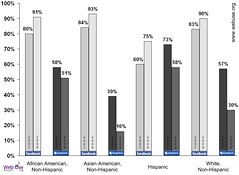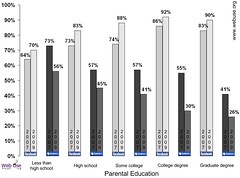UPDATE (8/13/08 11:04am CST): Google’s cache of the original Information Age piece makes it clear that the report had been altered considerably without any indication of this. (See screen shot here in case link no longer works.) Take-away: Information Age made considerable changes to its piece without indicating this anywhere in the post. That seems problematic. [Thanks to Bigcitylib for finding the cached page.]
Have you heard?! Google removed cities in Georgia from Google Maps! Or so were the claims that started making rounds on the Interwebs yesterday so you may well have heard it. But did you believe it? This incident has been a fascinating example of how quickly some folks will believe and spread something without further reflection. To be fair, random tweets were not the only means by which this information started spreading, more established outlets posted about it as well (see some links below with additional context). Still, how likely was it that Google would do something like this?
When I saw the post about it on the social news site Reddit yesterday (a post supported enough by readers of that site to make it onto a top page), I clicked through to look at the map. While interesting to note that the amount of information on Georgia was much less than many other countries, looking around on Google Maps made it clear that some parts of the map are simply less detailed than others. I also thought about the assertion for a moment. It didn’t sound very plausible. While Google may do all sorts of things that annoy various constituencies, it has been quite consistent in not wanting to block information even when people’s preference is that it would do so suggesting the claims to be unlikely. (Yes, I’m fully aware of some blocking in some specific cases on search engine results pages depending on local laws across the globe. Those are not incidents of this type though.) Short wrap-up: the details from the maps hadn’t been removed, they were never there to begin with. Interestingly, that idea did not occur to the many folks who reposted the information.
Here is an additional intriguing aspect to all this that I came across as I was looking at sites while writing this blog post. Might one of the reports about the incident been updated without any indication of an edit to the original report? I’m not making any accusations (it would be pretty ironic to do so in this post in particular), I’ll just post what I have found and welcome feedback. This Foreign Policy blog post about the Google Maps Georgia depiction references this piece in Information Age about the incident as follows:
As if Georgia didn’t have enough to deal with, yesterday the country’s cities and transportation routes completely disappeared from Google Maps. Reportedly wanting to keep its cyber territory conflict-neutral, Google removed all of Georgia’s details from its maps, making the war-torn nation look like a ghostly white blob flanked by Russia and Turkey. Georgia, though, isn’t the only country going blank on Google: neighboring Armenia and Azerbaijan–who have their own ongoing terrorital dispute over the Nagorno-Karabakh region–are coming up empty too.
An NYTimes Bits post also links to that IA piece. [UPDATE: Just to clarify so people don’t misunderstand, NYTimes Bits linked to this as an example of incorrect reports.] (So you can see what these sites looked like when I linked to them, I have posted screenshots of the FP post, IA piece and NYTimes Bits post.)
However, curiously, the IA piece doesn’t refer to tinkering with the maps, rather, it suggests that such reports were incorrect:
Meanwhile, reports that the company removed details of Georgian civil infrastructure from its Google Maps were inaccurate, it said today.
“We have never had local data for those countries and that is why local details such as landmarks and cities do not appear,” a company statement said.
But would writers at both the Foreign Policy blog and the NYTimes Bits blog have linked to this piece as a source for the tweaking if all it had stated was that the reports were inaccurate? Curious. I’m left wondering if an update had been made to the IA piece without any indication of it.
In the end, the ruckus about Georgia’s depiction on Google Maps was big enough that Google decided to respond with a post not only on its LatLong blog, but also the Official Google Blog (with about half a million feed subscribers).


